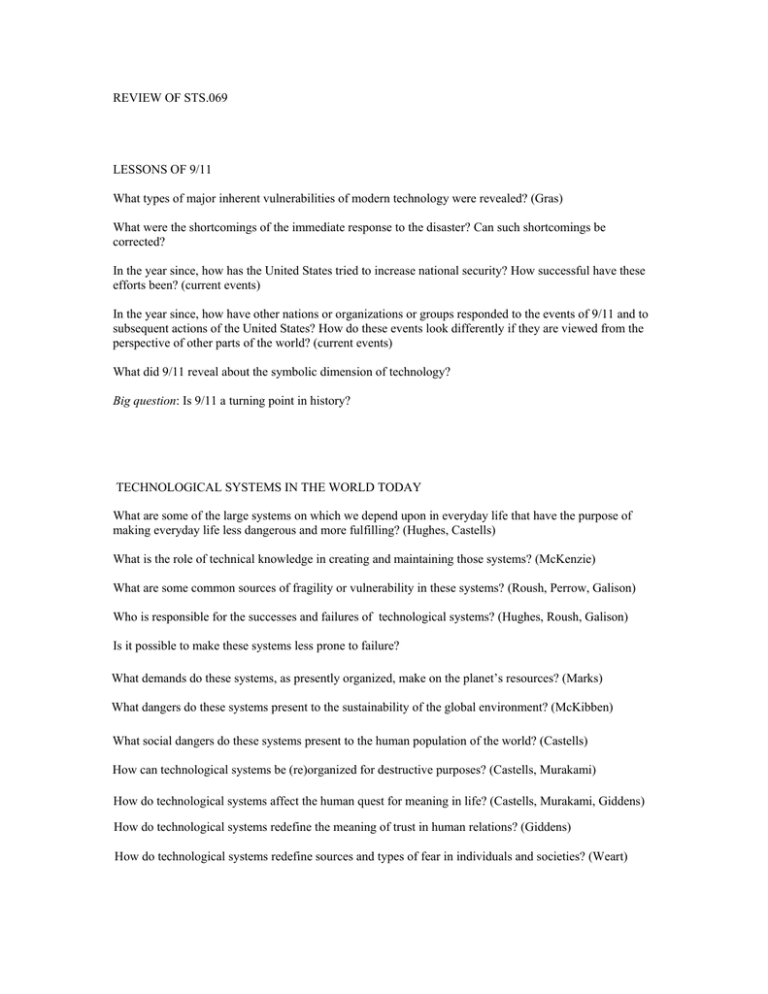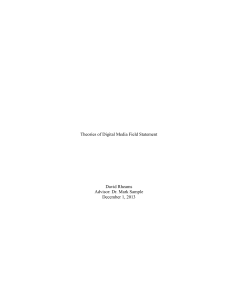Document 13651305
advertisement

REVIEW OF STS.069 LESSONS OF 9/11 What types of major inherent vulnerabilities of modern technology were revealed? (Gras) What were the shortcomings of the immediate response to the disaster? Can such shortcomings be corrected? In the year since, how has the United States tried to increase national security? How successful have these efforts been? (current events) In the year since, how have other nations or organizations or groups responded to the events of 9/11 and to subsequent actions of the United States? How do these events look differently if they are viewed from the perspective of other parts of the world? (current events) What did 9/11 reveal about the symbolic dimension of technology? Big question: Is 9/11 a turning point in history? TECHNOLOGICAL SYSTEMS IN THE WORLD TODAY What are some of the large systems on which we depend upon in everyday life that have the purpose of making everyday life less dangerous and more fulfilling? (Hughes, Castells) What is the role of technical knowledge in creating and maintaining those systems? (McKenzie) What are some common sources of fragility or vulnerability in these systems? (Roush, Perrow, Galison) Who is responsible for the successes and failures of technological systems? (Hughes, Roush, Galison) Is it possible to make these systems less prone to failure? What demands do these systems, as presently organized, make on the planet’s resources? (Marks) What dangers do these systems present to the sustainability of the global environment? (McKibben) What social dangers do these systems present to the human population of the world? (Castells) How can technological systems be (re)organized for destructive purposes? (Castells, Murakami) How do technological systems affect the human quest for meaning in life? (Castells, Murakami, Giddens) How do technological systems redefine the meaning of trust in human relations? (Giddens) How do technological systems redefine sources and types of fear in individuals and societies? (Weart) Big questions: What are the biggest sources of danger to humanity today that arise from the technological organization of human life? How may those dangers be reduced? RESPONSIBILITIES OF MIT TODAY What are the organizational goals and values of MIT? What is the legitimizing identity of MIT? What other types of identity may be found at MIT, and/or is the legitimizing identity undergoing a transformation? (Castells) What has been MIT’s historic role in rendering public service, especially in the realm of national security? (Hughes, McKenzie, MIT museum, Postol) What has MIT been doing during the past year to render public service in the post-9/11 context? (Gast, Canizares, Keith, Marks, Postol) What challenges has MIT faced in the past year in the context of national and international responses to 9/11? (Canizares, Keith) Big questions: What should MIT be doing as an organization to make this a less dangerous world? What should you be doing as an individual?

